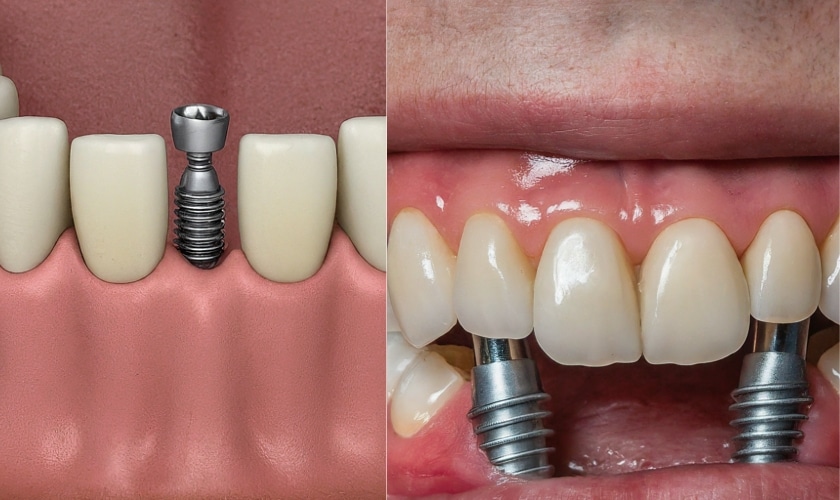Some Known Questions About Dental Sense.
Some Known Questions About Dental Sense.
Blog Article
3 Simple Techniques For Dental Sense
Table of ContentsRumored Buzz on Dental SenseNot known Facts About Dental SenseNot known Facts About Dental SenseWhat Does Dental Sense Do?
are medical devices surgically dental implanted right into the jaw to recover an individual's ability to chew or their appearance. They supply support for man-made (phony) teeth, such as crowns, bridges, or dentures. When a tooth is shed because of injury or condition, an individual can experience issues such as quick bone loss, faulty speech, or modifications to eating patterns that result in discomfort.Oral implant systems contain a dental implant body and oral implant abutment and may additionally consist of a joint fixation screw. Same day dental implants. The oral implant body is surgically put in the jawbone instead of the tooth's origin. The dental implant joint is generally connected to the implant body by the abutment fixation screw and extends via periodontals into the mouth to sustain the attached synthetic teeth
(http://www.askmap.net/location/7224225/united-states/dental-sense)Framework of The Dental Implant System choosing oral implants, speak with your dental service provider regarding the possible benefits and dangers, and whether you are a candidate for the procedure. Things to think about: Your overall health and wellness is a crucial consider figuring out whether you are a great candidate for dental implants, the length of time it will certainly take to heal, and for how long the implant may remain in area.
Smoking may impact the healing procedure and reduce the long-lasting success of the implant. The recovery process for the dental implant body may take numerous months or longer, throughout which time you commonly have a temporary joint in location of the tooth. the dental implant treatment: Meticulously comply with the dental hygiene guidelines provided to you by your oral copyright.
Facts About Dental Sense Uncovered
Implant failing can lead to the demand for one more medical procedure to deal with or replace the implant system. Recovers the ability to eat Recovers cosmetic look Assists keep the jawbone from shrinking due to bone loss Preserves the wellness of the bordering bone and gums Assists keep surrounding (close-by) teeth secure Enhances top quality of life Damage to surrounding all-natural teeth during implant placement Injury to the surrounding cells throughout surgical procedure, such as sinus perforation Injury during surgical procedure (for instance, fracture of surrounding jawbone) Insufficient feature, such as seeming like the teeth do not bite together usually A sensation that the tooth hangs or turning in position resulting from a joint screw loosening up Implant body failing (looseness of the dental implant body) due to systemic infection, which may be more probable in people with unchecked diabetes due go to this website to regional infection in bone and periodontals sustaining the dental implant body because of postponed recovery, which might be a lot more most likely in people that smoke Difficulty cleaning the gum tissues around the dental implant, leading to poor oral hygiene Neglected gum illness Post-surgical feeling numb as a result of nerve impingement or damages Constantly alert health treatment suppliers and imaging service technicians that you have oral implants prior to any kind of magnetic vibration imaging (MRI) or x-ray treatments.
FDA is not mindful of any kind of damaging occasions reported for MRI or x-ray treatments with oral implants. Oral implants systems are typically made from materials that comply with worldwide consensus standards of the International Company for Standardization (ISO) or ASTM International. These criteria have details of what makes a risk-free material.

A dental implant is a framework that changes a missing tooth. With screw-like gadgets, the cosmetic surgeon inserts a dental implant right into the jawbone, and it serves as a support for a synthetic tooth, called a crown. A tool called an abutment links the fabricated tooth to the dental implant. The crown is tailor-made to fit the individual's mouth and match the color of their teeth.
How Dental Sense can Save You Time, Stress, and Money.
Some people are not eligible for oral implant surgical treatment. It is for dental doctors to operate individuals with: severe illnessuncontrollable metabolic diseasebone or soft tissue disease or infectionIf these issues are fixed, a person can have the surgery. In, dental doctors refrain from running on individuals with: If individuals with any of the above undergo dental implant surgery, there is a greater threat of the dental implant falling short.

Oral dental implant surgery is an individualized procedure. Give you time to heal. Connect the article and last crown, bridge or denture.
Next off, your doctor will carefully place the oral implant right into your jaw. If your implant is near the front of your mouth, your dental professional will make a temporary tooth for you to put on till you recover.
The Basic Principles Of Dental Sense
Throughout the healing stage, your jawbone must fuse to the dental implant. This procedure can take anywhere from 3 to 9 months.
Once your dental implant heals, your dental practitioner can connect the abutment (small adapter post) and your final remediation (crown, bridge or denture). This usually takes regarding one hour to finish and may call for a second minor surgical procedure. You shouldn't feel any type of discomfort throughout your dental implant procedure since your service provider will make use of medication to numb your periodontals.
Report this page